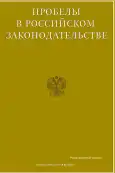Criminal and Legal Bases of Organizing an Extremist Community: the Concept and Features of Qualification
- Authors: Animokov I.K.1
-
Affiliations:
- North Caucasus Institute for Advanced Studies (branch) of the Krasnodar University of the Ministry of Internal Affairs of Russia
- Issue: Vol 15, No 4 (2022)
- Pages: 203-208
- Section: Articles
- URL: https://journal-vniispk.ru/2072-3164/article/view/147555
- ID: 147555
Cite item
Abstract
Extremism and extremist activity are widespread in the modern world, and therefore, the study of the theoretical, legal and practical aspects of criminal liability of an extremist orientation retains significant relevance. It is important to note that the current Russian criminal legislation regulates in great detail certain elements of criminal acts of the above-mentioned nature, and investigative and judicial practice demonstrates a large number of cases considered under the relevant articles of the Criminal Code of the Russian Federation. Among the crimes of an extremist orientation, it seems necessary to single out the organization of an extremist community as the most significant act, the consequence of which is the extremist activity of the corresponding organized group of persons. The purpose of writing a research paper is to analyze the criminal and legal bases of organizing an extremist community. The author comes to the conclusion that the current legislation and the practice of the top judicial bodies define the content of the category "extremist community" in great detail, including focusing on certain aspects of its organization, but in the context of the dynamic improvement of criminal practice in the modern world, it is required to study the stated issues, taking into account the existing legal and political realities. In the legal literature, there are many studies devoted to certain aspects of the organization of extremist communities, including some proposals for improving legislation and law enforcement practice in this area. Based on the analysis, a proposal was formulated to improve Art. 282.1 of the Criminal Code of the Russian Federation, within the framework of which, as an independent element of a criminal act, it is necessary to single out the creation of an extremist community with the definition of proportionate responsibility for the specified crime, taking into account the importance of the organizational aspect for the commission of further illegal actions by the relevant community.
Full Text
##article.viewOnOriginalSite##About the authors
Islam Kanshoubievich Animokov
North Caucasus Institute for Advanced Studies (branch) of the Krasnodar University of the Ministry of Internal Affairs of Russia
Email: islam_animokov@mail.ru
Lecturer of the State and Civil Law Disciplines Department Nalchik, Russia
References
- Kalugin A.G. Features of the subject of proof in the investigation of the organization of an extremist community // Scientific component. 2021. No. 3 (11). pp. 15-25.
- Kozaev N.Sh., Ryasov D.A. Extremist community as a form of organized criminal activity // Bulletin of economic security. 2021. no. 6. S. 76-80.
- Magnutov Yu.S. Legal innovations in the field of countering organized forms of extremist activity: doctrine, practice, technique // Legal technique. 2021. No. 15. S. 612-614.
- Morozova A.A. Prevention of the involvement of students in extremist organizations // Innovations. The science. Education. 2022. No. 53. S. 209-213.
- Peisikova E.V. Decree of the Plenum of the Supreme Court of the Russian Federation of October 28, 2021 No. 32 "On amendments to some Resolutions of the Plenum of the Supreme Court of the Russian Federation on criminal cases": the most important clarifications // Criminal Law. 2022. No. 3 (139). pp. 39-49.
- Polichnoy R.V. Correlation between a terrorist organization, a terrorist community, an extremist organization and an extremist community // Gaps in Russian legislation. 2017. No. 2. S. 143-145.
- Decree of the Plenum of the Supreme Court of the Russian Federation dated 06/28/2011 No. 11 "On judicial practice in criminal cases on crimes of an extremist orientation" (as amended on 10/28/2021) // Bulletin of the Supreme Court of the Russian Federation. 2011. No. 8.
- The state of crime in Russia for January - December 2021 // Official website of the Ministry of Internal Affairs of Russia. URL: https://media.mvd.ru/files/application/2315310 (date of access: 04/25/2022).
- The state of crime in Russia for January - March 2022 // Official website of the Ministry of Internal Affairs of Russia. URL: https://media.mvd.ru/files/application/3289503 (date of access: 04/25/2022).
- Criminal Code of the Russian Federation of 06/13/1996 No. 63-FZ (as amended on 03/25/2022) // Collection of Legislation of the Russian Federation. 1996. No. 25. Art. 2954.
Supplementary files








